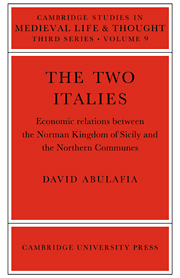Conclusion
Published online by Cambridge University Press: 02 February 2010
Summary
The aim here has been to show that the kings and the communes together drew wealth from the resources of the Regno and from the commercial activity of town and countryside – from the ports most obviously, but ultimately from the fields too. An attempt has also been made to demonstrate the weight of commercial considerations in the pattern of alliances woven by the Sicilian kings and by the north Italian communes; for here, as in the commercial contracts, the special value of the Regno as a composite and well-endowed market is indicated. The Regno was a mercantile centre that belonged wholly neither to east nor to west. As an entrepôt for the sale of the precious products of the further orient it shared many of the characteristics of Acre, Alexandria or Constantinople; so too in the use of golden money and in the κομμέρκιον-based tax structure; so too in the commercial connections of its numerous and elusive Jewish and Muslim merchants. As a producer of primary produce – wheat, skins, raw cotton – the Regno offers points of comparison with Provence, Sardinia or the agricultural regions of northern Italy, except that the imposition of political unity seems to have enlarged the scale of central control over the exploitation and transfer of agricultural and mineral wealth.
The question whether the presence of the north Italians was, in the long term, damaging to the Regno must be seen in the context of the rather exceptional identity of the kingdom as both an ‘oriental-type’ luxury market and as an ‘occidental-type’ agricultural producer.
- Type
- Chapter
- Information
- The Two ItaliesEconomic Relations Between the Norman Kingdom of Sicily and the Northern Communes, pp. 283 - 284Publisher: Cambridge University PressPrint publication year: 1977



